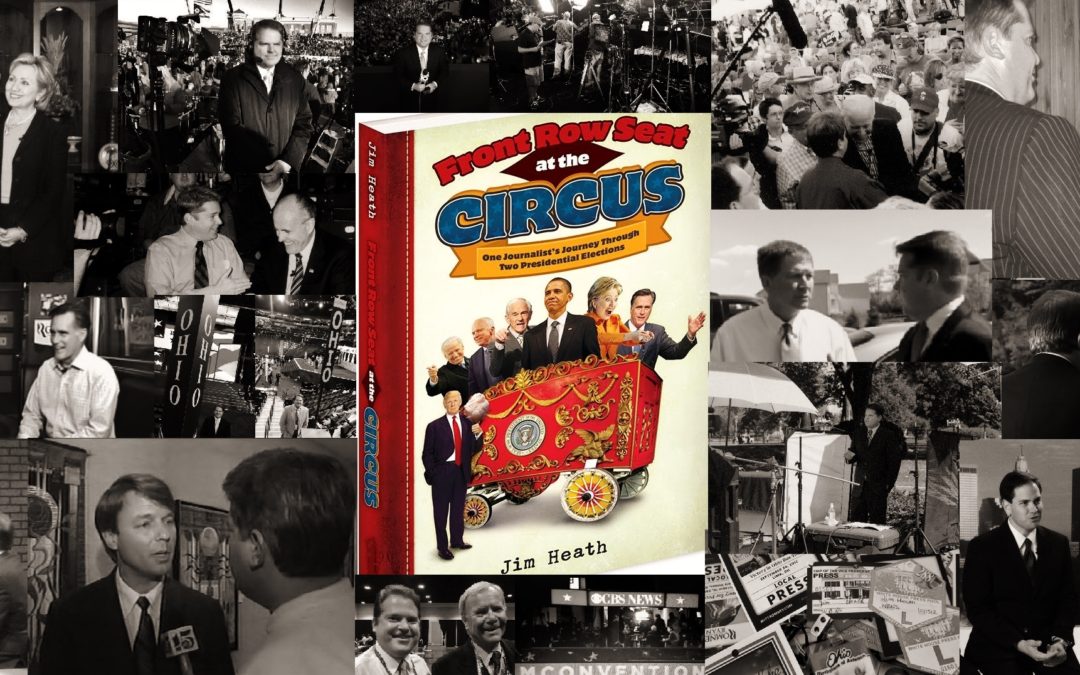 WILLIAM HERSHEY REVIEW
WILLIAM HERSHEY REVIEW
“I enjoyed Front Row Seat at the Circus, it’s good stuff!”
COLUMBUS: Jim Heath says he learned the names of America’s presidents before he mastered the alphabet. Since that wonky boyhood Heath has turned his fascination with politics into a career — first as a politician and most recently as a TV journalist in Columbus specializing in political coverage. His new book, Front Row Seat at the Circus: One Journalist’s Journey through two Presidential Elections, comes along just in time. The “circus” is the presidential campaign, already rollicking along for 2016 with Donald Trump so far the ringmaster.
Heath takes advantage of the reporting jobs he’s held in two states with great importance in presidential elections — South Carolina and Ohio — to provide a warts-and-all look at how reporters tried to cover the 2008 and 2012 campaigns and how the candidates tried to bend that coverage to their advantage.
South Carolina, where Heath worked at a Myrtle Beach station, provides the first-in-the-South primary that tests the candidates’ appeal in that region.
Ohio is ground zero for the general election, a must-win state for both candidates.
The book is easy reading for the politically inclined and also instructive as voters try to figure out what they want in a candidate in 2016, with the United States and the world on high alert because of escalating global terrorism.
Full disclosure: I was an occasional guest on Heath’s weekly public affairs show in Columbus when he worked for WBNS-TV, Channel 10. He left the station at the end of 2014 and currently is traveling to promote his book.
If the title implies that Heath doesn’t take the candidates seriously, that’s not the case.
He explores the difficulty reporters have in getting a clear answer from scripted candidates and explains the only way to do it — just keep asking the questions until they do answer.
Heath’s encounter with then candidate Barack Obama in the 2008 campaign makes the point. Obama’s campaign allotted Heath eight minutes but he kept talking and
stretched it to 12 until Heath got answers to questions about Obama’s view of the role race would play in the race and about Obama’s thoughts on the Clintons.
“He was pretty good,” Obama said as the interview wrapped up. “He fit in five questions after his last question.”
Heath described Obama’s style with reporters.
“As a lawyer, he can filibuster about every answer, leaving a journalist time to ask only two or three questions,” Heath wrote.
Heath had a different experience with Mitt Romney in 2012. It illustrated the danger to a candidate if he or she doesn’t pay close attention to the question.
During the Ohio primary, Heath asked Romney whether he supported proposed legislation in the U.S. Senate that would allow employers to deny health coverage for birth control.
“I’m not for the bill. But look, the idea of presidential candidates getting into questions about contraception within a relationship between a man and a woman, husband and wife, I’m not going there,” Romney answered.
Contraception and abortion, however, were big issues in the Republican primary. Romney’s answer sparked a firestorm.
Romney tried to put it out. He called a conservative talk-show host at a Boston radio station to explain himself.
“Of course I support the … amendment,” Romney said. “I thought he [Heath] was talking about some state law that prevented people from getting contraception. So I talked about contraceptives and so forth. I really misunderstood the question.”
Heath worried that he might have “burned a bridge” with the Romney campaign, but on the air stuck to his guns without impugning the candidate.
“Today I asked the governor a question about a bill, explained it and asked him about his position on it. His answer was definitive and we moved on. I believe the question was clear, the governor now says it was not, and that’s all it is. The interview is now history, and you can decide what, if any, importance it has on your vote this Tuesday,” Heath said.
While Heath’s interactions with the candidates provide good reading, I especially liked his rebuttal of the media’s “liberal” bias.
Heath’s background gives him the credentials to pass judgment.
Before getting into the news business, he was a fan of President Ronald Reagan and was elected the youngest Republican county chairman in the country, he wrote. He also was named the Arizona GOP “Man of the Year” in 1990, was a [George H.W.] Bush delegate to the 1992 Republican National Convention and worked five years as a press secretary for a Republican congressman.
Tenacity, not bias, makes a good reporter, wrote Heath.
“A political reporter’s job is to challenge an elected official, make them explain policy decisions, hold them accountable for their mistakes and explore what it is, exactly, they want to do,” Heath wrote.
“There is no big invisible liberal or conservative mothership hovering in the sky beaming down what to say or ask,” he added.
